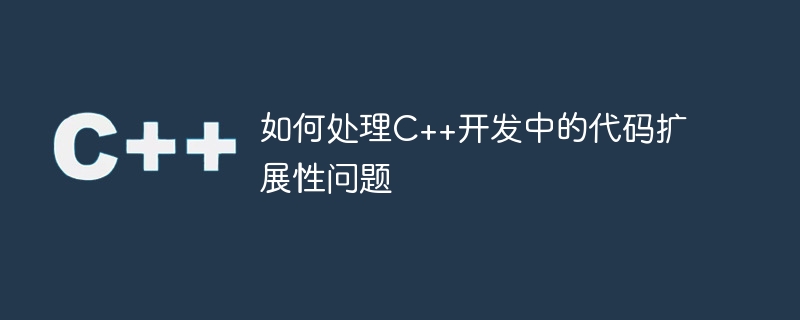
How to deal with the code scalability problem in C development
As the software becomes increasingly complex and the requirements continue to change, the scalability of the code becomes an important issue in software development. An issue that cannot be ignored. Especially in C development, the problem of code scalability is more prominent. This article will introduce some methods and techniques for dealing with code scalability issues in C development.
- Principles of using object-oriented programming (OOP)
Object-oriented programming is a programming paradigm that encapsulates data and operations, which can improve the maintainability and scalability of the code. In C, we can use classes to encapsulate data and operations, and use inheritance, polymorphism and other features to implement code expansion. The principles of object-oriented programming include encapsulation, inheritance and polymorphism. Proper use of these principles can improve the scalability of the code.
- Adopting design patterns
Design patterns are summaries and abstractions of solutions to recurring problems in software design. In C development, using design patterns can help us better manage the scalability of the code. Commonly used design patterns include singleton pattern, factory pattern, observer pattern, etc. Choosing the appropriate design pattern can reduce the coupling of the code and improve the scalability of the code.
- Using interfaces and abstract classes
Interfaces (pure virtual functions) and abstract classes can be used in C to define a common set of methods and properties. Using interfaces and abstract classes can provide a unified interface for different implementations, thereby improving the scalability of the code. By defining an abstract class or interface, you can clearly specify the methods and properties that each subclass should implement, thus facilitating code expansion and maintenance.
- Reasonable organization of code structure
A reasonable code structure is crucial to the scalability of the code. In C development, we can rationally organize source files and header files, and use namespaces to group related classes and functions. In addition, you can also divide folders according to functional modules and put related codes together to facilitate code management and maintenance.
- Use templates and generic programming
C's template and generic programming functions can improve the reusability and scalability of code. Templates can help us write common code, not only for different types of data, but also for different functions and classes. Generic programming can help us reduce code duplication and improve code reusability.
- Carry out code refactoring
During the software development process, as requirements change and the code continues to evolve, the code may become confusing and difficult to maintain. At this time, code refactoring can help us improve the readability and scalability of the code. Code refactoring is the process of making improvements to the structure of the code without changing its behavior. Through refactoring, complex code can be decomposed into logically clear modules, reducing code coupling and improving code scalability.
In short, the code scalability issue in C development is an issue that needs attention. The scalability of C code can be effectively improved by using object-oriented programming principles, design patterns, interfaces and abstract classes, rationally organizing code structures, templates and generic programming, and code refactoring. Only if code scalability is effectively handled can our software continue to adapt to new needs and changes.
The above is the detailed content of How to deal with code scalability issues in C++ development. For more information, please follow other related articles on the PHP Chinese website!
Statement:The content of this article is voluntarily contributed by netizens, and the copyright belongs to the original author. This site does not assume corresponding legal responsibility. If you find any content suspected of plagiarism or infringement, please contact admin@php.cn
